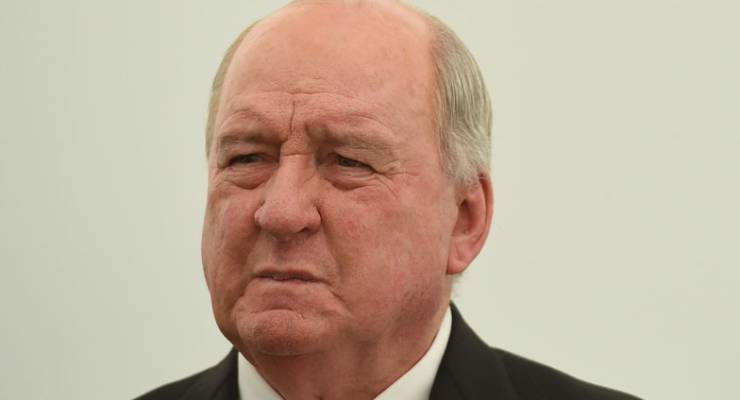
2GB broadcaster Alan Jones is scheduled to be back in court next year to answer a defamation lawsuit, adding to a long history of cases brought against the most powerful broadcaster in Australia.
This time, he and his radio stations are being sued over comments he made about the Wagner family’s role in the 2011 Grantham floods. Jones, the four Wagner brothers say, incorrectly implied that their quarry played a role in the deaths of 12 people in the flood. They settled a similar case against The Spectator Australia for more than $500,000 this week, and they are also suing Nine over a 60 Minutes story. The Wagners were cleared of responsibility over the deaths by a commission of inquiry in 2015.
In Jones’ 32 years behind the microphone, the so-called Parrot has given a wide range of people reason to sue for defamation, or at least try.
Jones’ keen interest (and strong opinions on) sport and its administration have been costly for himself and his networks. The head of the Australian Olympic Committee John Coates won $360,000 in damages in 2008 after a jury found Jones defamed Coates in 2004 while discussing the collapse of Olympic rower Sally Robbins in the Athens Games. The jury found that Jones implied Coates ordered a cover-up, bullied the crew and was a poor leader.
Chief racing steward Ray Murrihy won a defamation case that went to trial in 2000 about a 1996 broadcast in which Jones suggested he’d treated trainer Gai Waterhouse unfairly when she was being investigated by stewards.
Rugby Union chief executive John O’Neill settled a defamation against Jones in 1997. According to The Daily Telegraph, he carried a card around in his wallet for years, outlining his win after Jones called him a “failed banker” unsuited to running rugby.
In 1998, Jones claimed, on air, that rugby league referee Bill Harrigan was biased. Harrigan was awarded $90,000 in damages after the court found in his favour.
Law and order is another of Jones’ favourite topics for his show, and four senior police officers have reached settlements after suing Jones for defamation. Between 2003 and 2007, Jones settled cases brought by NSW assistant police commissioner Lola Scott, tactical police officer Terry Dawson and detective chief inspector Deborah Wallace and former assistant police commissioner Clive Small.
The managing director of the Manly Pacific Hotel Eric Yeung sued for defamation in 1994, saying Jones had suggested he was a heroin trafficker and had been involved in framing hotel owner Andrew Kalajzich for his wife Megan’s murder.
In 1989, then-councillor at the NRMA David Parker won $135,000 in damages after a 26-day trial, which was later overturned by the Court of Appeal. Parker had sued Jones and 2UE over an interview conducted in 1989. In 1994, Don Mackay, also of the NRMA, sued for defamation.
Robert Stitt, QC, who represented the Australian Broadcasting Authority in the cash-for-comment hearings, settled a defamation case against Jones for about $50,000 in 1999.
Former Sydney Morning Herald letters editor Geraldine Walsh reportedly settled a defamation case for $100,000. Aboriginal leader Pat Dodson also settled a case in 1998 after Jones said he’d wasted taxpayers’ money.
In 2003, Jones apologised in court to Mary-Lou Buck, who he’d claimed in 1997 on his then-radio station 2UE had acted fraudulently in settling a native title claim. Jones’ lawyer apologised in court in 2003 on Jones’ behalf, and the matter reportedly settled for an undisclosed sum, according to newspaper reports from the time.
Jones doesn’t always lose his defamation battles. In 1997, Jones had a win against the NSW Aboriginal Land Council, which tried to sue for defamation but which the NSW Court of Appeal found didn’t have feelings capable of being hurt. The council had alleged that an interview Jones conducted had imputed it conspired with others to pursue a native title claim it knew to be fraudulent.
And Jones does not shy away from suing others — he won a case against The Sydney Morning Herald in 2000 over a story that a jury found imputed he was a dishonest broadcaster, who had an agreement with AMP to stop criticising it in return for a benefit for his football club.
Jones’ trial in the Wagner matter is scheduled to start in April.








Unfortunately he doesn’t have to pay out of his own pocket – part of his multi million dollar contract with Singo is that Macquarie pays for everything, lawyers, settlements and damages.
What was it someone once said of his malign influence, “Patience, my pretties, patience!”?
Given all these nitwits used the same material and the same ludicrous fantasy hydrology to besmirch Wagners, I can’t see how the two pending cases won’t go the same way as the one settled